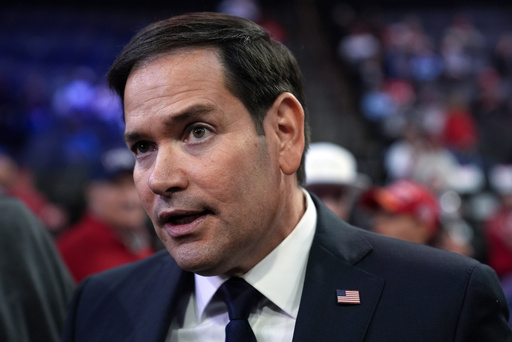WASHINGTON — President-elect Donald Trump, known for his atypical approach, has made traditional selections for two key foreign policy roles. This strategy may provide some reassurance to U.S. allies, while simultaneously raising concerns for nations such as China and Iran.
On Wednesday, Trump revealed his decision to appoint Senator Marco Rubio as secretary of state. This follows the earlier announcement of Representative Mike Waltz as national security adviser two days prior. Both appointees align with Trump’s stringent views regarding China and Iran and have shown a willingness to modify their foreign policy strategies to fit into Trump’s “America First” agenda, which necessitates loyalty from his team members.
Despite their alignment with Trump’s policies, Rubio and Waltz bring conservative credentials and foreign policy experience to the table, differing from Trump on issues related to Russia and NATO in the past. They have also displayed a willingness to collaborate with Democrats, as noted when Senator Mark Warner, a Democratic leader in the Senate Intelligence Committee, praised Rubio’s potential as a “strong voice for American interests” globally.
In contrast to some of Trump’s other choices for national security, which include Pete Hegseth, a Fox News presenter, as defense secretary and Rep. Elise Stefanik, who lacks substantial foreign policy experience, as the U.N. ambassador, Rubio’s selection may be viewed as a stabilizing force. Allies may also breathe a sigh of relief that Rubio was chosen over Richard Grenell, a fervent supporter of Trump who has shown a preference for autocratic regimes internationally.
Senator Rubio, serving for 14 years, holds senior roles on both the Senate Intelligence and Foreign Relations Committees. His background as a child of Cuban immigrants shaped his strong stances on Cuba and Venezuela, opposing leftist governments. While Trump’s previous criticisms of NATO and praises for Russian President Vladimir Putin have unnerved U.S. allies, Rubio has played a crucial role in advocating for U.S. commitment to NATO, leading initiatives to prevent any unilateral presidential withdrawal from the alliance without Senate consent.
However, Rubio, akin to Waltz in the House of Representatives, has adjusted his public comments and voting patterns to resonate more closely with Trump’s critique of the Biden administration, particularly concerning its support for Ukraine amidst its conflict with Russia. Initially supportive of military aid for Ukraine, Rubio and Waltz have recently shifted to opposing additional assistance, increasingly echoing Trump’s calls for a resolution to the war.
This shift contrasted sharply with other bipartisan voices advocating for robust U.S. support for Ukraine to ensure favorable terms in any future peace negotiations.
Kelly Grieco, a senior fellow at a Washington-based research institute, remarked that Trump seeks individuals around him who exhibit loyalty and share his views, hinting at a likely aggressive U.S. stance on China and Iran under these appointments. Analysts deem both Rubio and Waltz to be particularly hardline about China, coining them as part of a “Florida faction” in foreign policy due to their shared state origin.
During his first term, Trump had already implemented tariffs on China, signaling more economic pressure will follow. Rubio advocates for an even more assertive posture towards China and is a strong proponent of Taiwan, which is viewed by Beijing as part of its territory. He is recognized in China as an “anti-China vanguard,” known for his staunch anti-communist beliefs. His past support for Uyghur rights in Xinjiang and Hong Kong activists led to his placement on Beijing’s blacklist, casting uncertainty on how his relationship with Chinese officials will develop moving forward.
Mike Waltz, a former Green Beret with experience in combat, has a noteworthy background, having worked on defense policies and currently holding significant roles on various House committees. He champions the necessity of supporting Ukraine but emphasizes the need for neighboring countries to shoulder a larger share of Ukraine’s defense responsibilities. In a co-authored piece for The Economist, he highlighted the detrimental effects of the Biden administration’s perceived inaction in Eastern Europe and the Middle East on U.S. interests regarding China.
In 2021, Waltz proposed a resolution urging the U.S. Olympic Committee to withdraw from the Beijing Winter Games, citing multiple humanitarian concerns regarding the actions of the Chinese Communist Party (CCP). He argued that the international community should not endorse the CCP’s actions, such as human rights abuses and the responses to the COVID-19 outbreak, by participating in the games.
In response to Trump’s appointments, a spokesman from the Chinese foreign ministry withheld comments. An international relations expert from Shanghai noted a disparity between Trump’s casual attitude toward China and his appointees, who may indeed perceive China as a strategic rival.
Experts on China have expressed mixed feelings about Trump’s approach. While Trump may not hold strictly ideological views toward foreign relations, concerns persist regarding the potential volatility of his policies when compared to the past administration. Some suggest that elements within Trump’s group may aim for more radical outcomes against the Communist Party of China, which appears to deviate from efforts to reach a stable diplomatic resolution.


